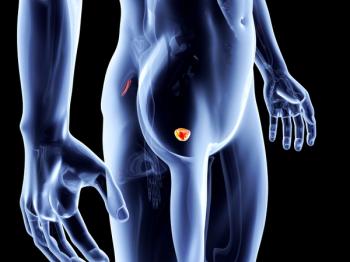
Gene Signatures Identify Aggressive Prostate Cancer
Two groups have each identified distinct gene signatures that may better predict the aggressiveness of prostate cancer at diagnosis.
Two groups have each identified distinct gene signatures that may better predict the aggressiveness of prostate cancer at diagnosis. The research was published in the Lancet Oncology.
The first study,
After further validation, these signatures could add prognostic value to already available, but only moderately predictive, risk factor analyses such as prostate-specific antigen (PSA) levels. Currently, prostate cancer prognosis is heterogeneous and current predictive models only have moderate success. A better way to accurately stratify patients as having either aggressive or less aggressive disease would also facilitate better clinical trials for new therapies.
“We desperately need new and better biomarkers in cancer,” said Dr. Oh. “Because biomarkers have the ability to distinguish cancers that are driven by different biological processes, and as we personalize the care of patients with prostate and other cancers, we need simple and reliable ways to separate those cancers, for instance, that will or will not respond to a certain treatment.” Dr. Oh added that prognostic markers can also create new targets for treatment.
Two Similar Approaches, Two Similar Outcomes
Dr. de Bono and team used whole-blood samples from both CRPC and lower-risk prostate cancer patients who are undergoing active surveillance. An unbiased mRNA gene expression analysis of 96 patients from the United Kingdom showed that the expression of nine genes could predict those CRPC patients who had a poorer overall survival and worse prognosis. One quarter of the initial cohort had a worse prognosis. The team confirmed the clinical utility of the signature in an independent cohort of 70 patients from the United States. The signature stratified patients with aggressive prostate cancer, showing that those with the nine-gene pattern survived an average of 9.2 months after referral for treatment, compared to 21.6 months for those who did not test positive for the RNA signature.
Seven of the nine genes in the signature had high expression in CD71-positive early erythroid cells, but not normal blood cells. The authors postulate that the signature may represent early evidence of cancer infiltration into the bone marrow. Other genes that differed between the lower and higher risk CRPC patients had to do with white blood cell function. Patients with this signature could have a poorer prognosis due to altered immune function. Other recent data have also implicated effects of the immune system in prostate cancer outcomes.
Dr. Oh and colleagues collected blood samples from 62 men with CRPC and analyzed the samples for the expression of 168 inflammation-related and prostate cancer-related genes. The team validated the results using a 138-patient cohort.
The genes were selected from a set of hundreds of genes reported in the medical literature to be important in prostate and other cancers, said Dr. Oh, as well as genes involved in inflammation. “Pilot studies led to a panel of 168 genes we thought were most likely to distinguish important differences in outcomes.”
The identified six-gene signature stratified patients into two groups: a high-risk group with a median survival time of 7.8 months and a low-risk group with a median survival of 34.9 months. The genes were found to be preferentially expressed in immune cells-monocytes, natural killer cells, and T cells. The six-gene signature had similar predictive properties as those identified by the UK-led research team.
Immune Function Predicts Prostate Cancer Aggressiveness
The result that immune function is key to prostate cancer outcome is very surprising, said Dr. de Bono.
“The biggest surprise of this study was that the most significant six genes which predicted survival were not primarily cancer-related genes, but were involved in immune function,” said Dr. Oh. “In some ways, this is not a surprise, since it suggests that the patient’s innate immune response to cancer may be a strong predictor of the impact of the cancer.” Dr. Oh added that the function of the identified genes in the immune system is not yet understood. Nor is it understood how the genes may interact and lead to a difference in survival for patients.
Both authors of the studies see the RNA analysis as highly applicable for the clinic. Dr. Oh said that the particular six-gene signature his study identified “could be translated fairly easily to the clinic, since it uses simple technologies such as PCR to identify the genes of interest.” Dr. Oh and colleagues collected the RNA in blood using a special preservation tube (PAXgene), which are widely available. Dr. de Bono and colleagues are currently testing whether a DNA analysis could provide the same information.
Dr. Oh highlighted the different approaches of the two teams: “What is interesting about the Royal Marsden paper is that they took a very different analytic approach, which in fact looked at more genes and was thus potentially more unbiased, and found that the most prognostic genes were again driving immune function in patients.” Both teams ended up with a similar result: “The blood contains a molecular signature in patients with advanced prostate cancer which predicts survival based on the functioning of the immune system.”
Follow-Up Studies
The next step?
“Conducting further evaluation in larger trials and in trials of immune activating drugs,” said Dr. de Bono.
Dr. Oh and colleagues are validating their prognostic signature using an additional cohort of patients with prostate cancer. The team is also proposing larger validation cohorts and prospective trials using the gene signature. “Since it's also possible that this signature is not unique to prostate cancer patients, we are planning to look at it in other malignancies,” said Dr. Oh.
Biological evidence for the prognostic value of some of the genes already exist, Dr. Oh noted. “We published a study recently which showed that TIMP-1 protein also has prognostic significance in CRPC. So this validates the gene as important, though we don’t yet know the exact mechanism for why higher levels of TIMP-1 is associated with a worse outcome. We are looking at cell lines and preclinical models to explore this.”
In a comment accompanying the two articles, Karina Dalsgaard Srensen, MD, of Aarhus University Hospital in Denmark stated that whether blood mRNA expression signatures will be “true game changers for management of CRPC is too early to say.”
“The simplicity of both tests is attractive and might ease their clinical translation. However, large-scale prospective studies are needed to validate their biomarker potential, and to define the exact clinical context in which they can be used,” Srensen added. The editorial author also emphasized the need to incorporate these signatures into clinical trials to test their predictability and accelerate clinical translation.
Newsletter
Stay up to date on recent advances in the multidisciplinary approach to cancer.














































